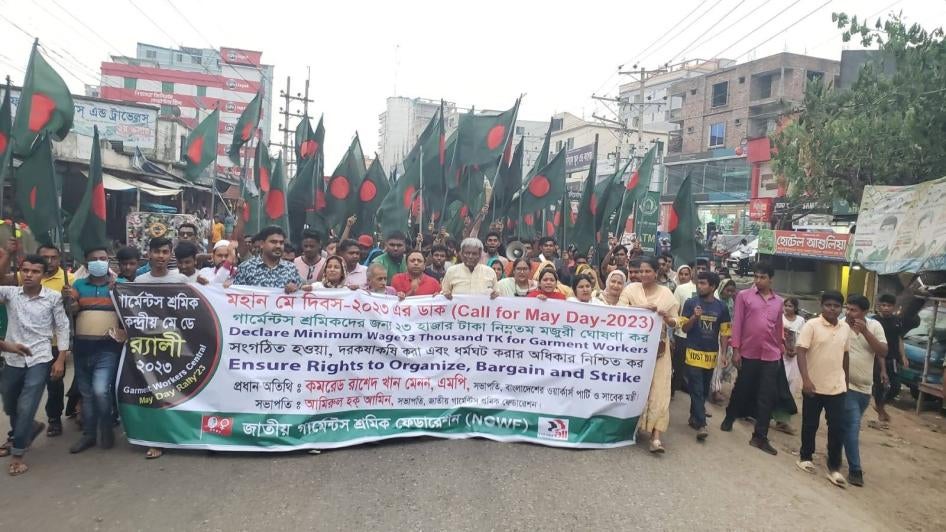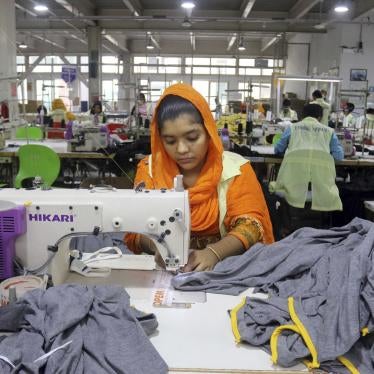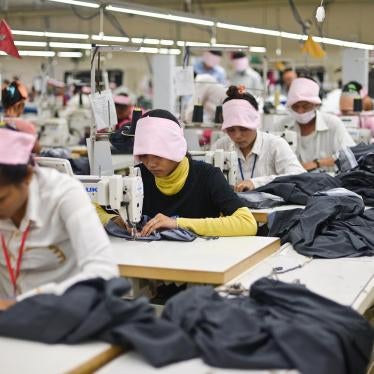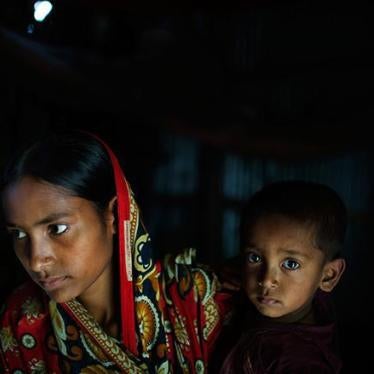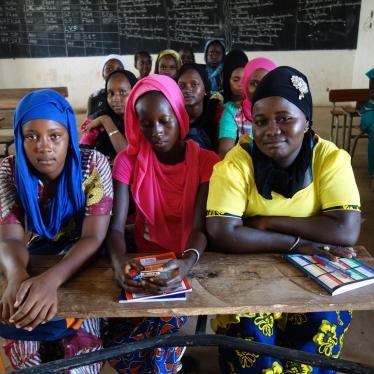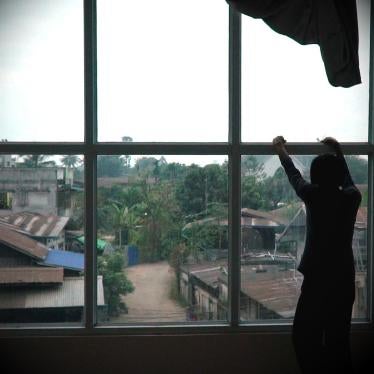- ブランドや小売業者が利用する社会監査や認証評価は、労働者、特に独立した労働組合を組織しようとする労働者が直面する脅威の保護策としては機能しないも同然である。
- ヒューマン・ライツ・ウォッチの調査によれば、標準的な社会監査では、結社の自由を含めた労働権の侵害は、十分には又はまったく発見されないおそれが強い。
- 世界的なブランドや小売業者は、自社バリューチェーンについて、結社の自由に関する労働者の権利をモニタリングする方法を見直すべきである。
(ロンドン)ヒューマン・ライツ・ウォッチは本日、バングラデシュの縫製工場に関する標準的な社会監査報告書の分析結果を発表し、ブランドや小売業者が利用する社会監査や認証評価は、労働者、特に独立した労働組合を組織しようとする労働者が直面する脅威の保護策としては機能しないも同然であると指摘した。
監査報告書の大半は、結社の自由の問題をほぼ素通りしており、一部には、結社の自由に関する監査人の所見の一部として、他の工場の監査報告書の表現を使い回すものもあった。ヒューマン・ライツ・ウォッチは前回調査で、標準的な社会監査では、特に差別やハラスメント、強制労働、児童労働、結社の自由といった問題について、労働権の侵害が、十分には又はまったく発見されないおそれが強いことを明らかにしている。
こうした欠点の深刻さは、2023年6月にバングラデシュで起きたシャヒドゥル・イスラム氏殺害事件を踏まえるといっそう重要なものとなる。独立した労働組合の指導者だったイスラム氏は、プリンス・ジャカード・セーター社(以下「プ社」)が操業する工場から帰るところを殺害された。賃金とイードボーナスの未払いをめぐり、縫製労働者を代表して交渉を試みた後のことだった。この工場は、一般的に使用されている2つの社会監査制度の下で監査を受けていた。
「イスラム氏の殺害は、ぞっとするような出来事であり、独立した労働組合の幹部が置かた危険な状況を浮き彫りにした」と、ヒューマン・ライツ・ウォッチの企業責任局長代理のアルナ・カシャップは述べた。「ブランドとサプライヤーは、社会監査や認証評価に頼るべきではない。こうした仕組みは不十分そのもので、とくに独立した労働組合の結成や加入を求める労働者に対する暴力や嫌がらせを防ぐ上では役に立たない」。
ヒューマン・ライツ・ウォッチは、2018年にヨーロッパのあるアパレルブランドから提供された、バングラデシュの衣料品工場の社会監査報告書40件についての分析結果を発表した。世界的なブランドや小売業者は、自社バリューチェーンについて、結社の自由に関する労働者の権利をモニタリングする方法を見直すべきである。
イスラム氏の殺害事件に関連し、バングラデシュ当局は、刑事事件としての捜査を進めており、逮捕者も相次いでいる。ヒューマン・ライツ・ウォッチのインタビューに応じた人びとの話では、襲撃事件が起きた地域一帯で活動するいわゆる「黄色(御用)組合」に関わる複数の「チンピラ」が逮捕されたようだ。あるベテラン活動家によると、2020年12月以降、労働者から脅迫や嫌がらせの報告があったときにも、このうち数名の名前が挙がっていた。バングラデシュ当局は、独立した徹底的な調査を実施し、襲撃の指示、計画、実行に関与したすべての者の責任を問うべきだと、ヒューマン・ライツ・ウォッチは述べた。
黄色(御用)組合は使用者によって設立または管理されたもので、労働権に関する国際法が保障する結社の自由に対する労働者の権利を侵害する。独立した労働組合を組織しようとする労働者の試みを妨害する目的で用いられ、バングラデシュでは問題が深刻化している。
バングラデシュ当局と縫製業者が、独立した労働組合の活動の権利に対する侵害を抑制してこなかったことは、「黄色組合」の増加と関わりがある。これが一因となり、独立した労働組合や労働者への暴力や嫌がらせが増えていると、ヒューマン・ライツ・ウォッチは指摘した。
ブランドは通常、標準的な社会監査や認証評価プログラムに依拠する。これは労働現場の民間査察であり、通常は監査会社によって実施され、労働基準など行動規範の遵守状況を評価する。検査は数日間にわたって実施され、ブランドまたはサプライヤーが費用を負担するのが一般的だ。労働者は工場敷地内でインタビューを受けるが、こうした場所は労働条件について率直に話せる安全な空間ではない。またこれらの監査報告書が公表されることはない。
プリンス・ジャカード・セーター社(Prince Jacquard Sweater Ltd.)は、amforiとSedexという2つの有名な第三者社会監査プログラムによる社会監査をすでに受けていた。6月、ヒューマン・ライツ・ウォッチはamforiとSedexに書面で問い合わせを行ったところ、この工場が過去に自社のプログラムによる監査を受けたことがあることを共に認めた。Sedexの担当者は、監査の「具体的な詳細」については守秘義務があるため、監査結果の要約を提供することはできないと述べた。amforiも守秘義務があると回答したが、監査によって賃金関連の問題がいくつか発見されたことを示す簡単な要約を提供した。プ社はヒューマン・ライツ・ウォッチの問い合わせに回答しなかった。
Sedexとamforiは、プ社の社会監査報告書を公開するとともに、すべての社会監査報告書を検索可能なデータベースで公開するよう、方針を改定することを公約すべきだと、ヒューマン・ライツ・ウォッチは述べた。
より広い観点で、すべての社会監査および認証評価プログラムには、監査報告書の公開が義務付けられるべきだ。トランスペアレンシー(透明性)がなければ、報告書の内容や、監査法人や監査プログラムが作成した情報においてどの程度信頼できるかについて判断できない。ヒューマン・ライツ・ウォッチが、2022年のものを含む複数の未公表「Sedex会員倫理取引監査」(SMETA)報告書を検討したところ、たとえば、Sedex監査報告書には、Sedexによる監査が「いかなる法的規制や業界基準へのコンプライアンスを……確認するものではない」という標準的な免責事項が記載されていることを確認した。ヒューマン・ライツ・ウォッチ宛の書簡で、Sedexはこの免責事項をウェブサイトやその他のマーケティング資料で公表するとの確約をしなかった。
人権デューデリジェンス(人権DD)を義務づける法律が各国で策定されていることを踏まえ、政策立案者には第三者監査・認証評価プログラムの限界を認識することが求められる。また、監査法人や監査プログラムに対し、提供する社会監査サービスの品質と信頼性についてサービス提供者としての責任を負わせるとともに、ブランドに対しても、自社が用いるリスクベースのデュー・ディリジェンス・ツールへの責任を負わせるべきだ。
各国政府には、社会監査業界を詳しく調査し、ブランドに対して、人権・環境デューデリジェンスの一環として社会監査や認証評価を利用する場合には、すべての社会監査報告書を公表するよう義務づけることが最低限求められる。
ブランドや小売業者に人権・環境デューデリジェンスを義務付ける法律の下、社会監査や認証評価さえあればデューデリジェンスを行ったと扱われるべきではない。amforiやSedexといった団体は、社会監査ツールが規制監督に代わるものではないことを繰り返し認めている。
社会監査や認証評価に頼ることは、結社の自由や団体交渉にまつわる問題に対処する適切な方法ではない。むしろブランドは、バングラデシュで活動する独立した労働組合や労働者権利団体と協議の上で、モニタリングと被害救済システムの構築を支援すべきだ。こうしたメカニズムは、国連「ビジネスと人権に関する指導原則」に概説されている有効性基準に則るとともに、少なくとも、そうしたモニタリング・被害救済メカニズムのガバナンスに関して、独立した労働組合にも企業と同等の権限を保障すべきである。
現在、見直しが進む「繊維・衣料品産業における安全衛生に関する国際協定」に加わるブランドは、労働者の結社の自由と団体交渉に対する保護内容の拡大に取り組むべきだ。まだ加盟していないブランドは協定に加わるべきである。
ブランドはまた、公正な価格と責任ある契約などの公正な購買慣行を評価し、採用することで、無断下請けなどの労働権の侵害行為を引き起こしたり、助長したりするリスクを防止し、軽減すべきである。
「ブランド、監査法人、監査・認証評価制度は、監査や認証が独立しており信頼に足るものだとうたっている」と、前出のカシャップ局長代理は述べる。「しかし、監査や認証制度に欠陥や不透明な点があってその独立性や情報の信頼性が疑わしい場合、人権デューデリジェンスのツールとして使用することはできない」。
Freedom of Association and “Yellow Unions” in Bangladesh
Bangladesh has a longstanding pattern of violations of the rights of freedom of association and collective bargaining. The police cracked down on independent unions following wildcat protests by workers demanding wage increases in 2016 and 2019. The International Labour Organization (ILO) Committee of Experts on the Application of Conventions and Recommendations noted in its 2022 report a series of legal and other practical barriers, and union-busting tactics used by employers, that thwarted workers’ ability to join and form unions of their choosing.
Further, Bangladesh law does not allow the formation of unions in factories located inside export processing zones, and workers are only permitted to form worker welfare associations, which have fewer legal protections than the already low protections for unions. Reforms are needed to give unions protections in line with the ILO recommendations.
“Yellow unions” are set up or controlled by employers and violate workers’ right to freedom of association under international labor rights law. The International Labour Organization’s Convention on Right to Organise and Collective Bargaining (Convention No. 98) states in article 2(2) that “acts which are designed to promote the establishment of workers’ organisations under the domination of employers or employers’ organisations, or to support workers’ organisations by financial or other means, with the object of placing such organisations under the control of employers or employers’ organisations, shall be deemed to constitute acts of interference within the meaning of this Article.”
The ILO Committee on Freedom of Association has ruled that “the intervention by an employer to promote the establishment of a parallel trade union constitutes an act of interference by the employer in the functioning of a workers association, which is prohibited under Article 2 of Convention No. 98.” Workers have the right to form or join unions of their choosing that genuinely represent workers’ rights and interests.
A 2020 US Senate Foreign Relations Committee report on Bangladesh noted concerns about growing yellow unionism in Bangladesh, and that the practice “has resulted in authorities rejecting the registration application of independent union leaders because another union already exists – the ‘’yellow’’ one.”
The Solidarity Center, an international worker rights organization, told Human Rights Watch that according to union registration data it analyzed, garment factory-level unions affiliated with six independent union federations had an average union registration success rate of about 43 percent from 2020 through 2022, compared with what the Bangladesh government states is the overall average union registration success rate of about 88 percent.
The Islam Case
Islam was the Gazipur president of the Bangladesh Garment and Industrial Workers Federation (BGIWF), an independent union federation. A criminal complaint registered by the police said that he and other representatives met with officials from Prince Jacquard Sweater Ltd. to try to resolve workers’ complaints regarding unpaid wages for the months of May and June and an Eid bonus. As the representatives were leaving and reached the front of the factory, a gang approached and threatened them for helping workers, and attacked them. The attackers beat Islam unconscious and he was declared dead in a hospital.
The criminal investigation has yet to be completed and based on Human Rights Watch interviews, the police have yet to determine who was behind this gang’s violence. The factory management has denied links to the attack and says it paid all of the previously unpaid wages following Islam’s death. Human Rights Watch wrote to the factory seeking additional information about clearing unpaid wages and the bonus, and Prince Jacquard Sweater Ltd. has yet to respond.
The Bangladesh Garment Manufacturers and Exporters Association (BGMEA) has sought to cast the attack on Islam as one between trade unionists without drawing a distinction between independent unions and “yellow unions,” which is deeply problematic. The BGMEA has yet to take effective measures to prevent management and its member factories from interfering with workers’ efforts to form independent unions and curb the growth of “yellow unions” among its member factories.
The social audit programs operated by amfori and Sedex are among two of the most widely used programs worldwide and not just limited to apparel. Sedex operates SMETA, while amfori operates the Business Social Compliance Initiative (BSCI). These are standard social audit programs that use codes of conduct covering a wide range of labor rights issues, including workers’ freedom of association and wages.
Sedex and amfori’s social audit programs are opaque and neither organization publishes their social audit reports. They also do not publish a list of names or street addresses of the sites they audit or the date of the last audit, making it nearly impossible for labor rights organizations and unions to find out which sites are even audited using their program.
In email responses to Human Rights Watch questions, Sedex stated that Prince Jacquard Sweater Ltd. had been audited once under its systems in 2021 but declined to specify the month or to summarize key audit findings and corrective actions. The factory itself was not a Sedex member and Sedex stated that “it had no visibility” over whether a Sedex member brand was sourcing from the factory.
An amfori representative stated that a factory was audited under its program in November 2021 and December 2022, and further stated that the reports found “multiple violations,” including “delayed payment of wages, a failure to ensure annual wage increments as stipulated by law, gaps in benefit payments, and irregular deductions in payments.” The representative said they did not know the corrective actions that were taken and were finding out from amfori’s members. Human Rights Watch wrote to Prince Jacquard Sweater Ltd., requesting a copy of the audit reports and corrective actions. The factory did not respond.
(Email correspondence with Sedex and amfori on social audits pertaining to Prince Jacquard Sweater Ltd. on file with Human Rights Watch).
Human Rights Watch Analysis of Social Audit Reports
More broadly, and unrelated to Prince Jacquard Sweater Ltd., in 2018, a European brand provided 50 standard social audit reports to Human Rights Watch to enable the organization’s research and analysis, as social audits reports are typically not public. Forty of those 50 reports were from Bangladesh. The reports were provided on the condition that Human Rights Watch would not identify the company that provided them.
These were standard social audits conducted over a day or two, which Human Rights Watch understands is typical. Such audits are different from in-depth investigations. The factories were notified of the window within which audits would occur; that is, they are semi-announced, and auditors said they interviewed workers on site. The audits were conducted by six global audit firms, most in 2017 and 2018. The audit methods and reporting format continue to be used without significant changes.
In Bangladesh, 26 of the 40 audits were “full audits,” in which auditors had assessed all aspects of the Code of Conduct, including workers’ freedom of association, and 14 were “follow-up audits.”
In each audit, the auditors were expected to assess whether the factory respects workers’ rights to “form unions in a free and democratic way” and bargain collectively; “does not discriminate against workers because of their trade union membership” and “does not prevent workers’ representatives from accessing or interacting with workers in the workplace.”
Since the audits did not reveal the factory names, Human Rights Watch could not determine whether these 40 factories had in fact engaged in any anti-union practices around the time of the audits and compare them with audit findings.
But a reading of the audit reports based on what the auditors were expected to assess raises several concerns about how auditors evaluated risks to freedom of association. Six out of the 26 full audits found “none” or “no findings” when expected to outline what they found. In another report, the freedom of association section was blank. In 10 of the 14 follow-up audits, auditors had skipped assessments of workers’ freedom of association stating that no previous findings existed; noted they had no finding; or left the section blank.
Human Rights Watch analysis of two reports that noted the presence of a union raised additional concerns. In one factory, auditors from Audit Firm-4 had noted that there were more than 1,800 male and 2,100 female permanent workers, all unionized. In the other, auditors from Audit Firm-2 had noted that the factory had over 2,300 male and over 3,000 female workers, all unionized. However, neither factory had a collective bargaining agreement, which would be expected with a fully unionized workforce.
Audit Firm-2 had wrongly claimed that workers were “free to join or form the trade union” in a factory housed in an export processing zone where the law does not allow workers to form unions, and instead only allows the formation of worker welfare associations:
The overall observation shows that the audittee fulfills [sic] the requirements of this performance area. No trade union has been formed by the workers of the factory. Workers are free to join or form the trade union. No restriction has been imposed to [sic] the workers from the management. The facility has formed workers welfare association (WWA) through election process. Meeting of WWA was held on regular basis. No evidence was identified and reported that workers representatives are discriminated.
Human Rights Watch also found that a number of audit reports of different factories had identical or very similar language when describing audit findings related to freedom of association.
The use of such stock phrases across different factories is only possible to detect when numerous audit reports issued by the same audit firm are accessible. Regulators and courts should be aware that the quality of such social audit reports may not be fully assessed by looking at one report in isolation; rather other audit reports issued by the same audit firm in the same country should be analyzed to determine whether the audit firm uses stock phrases.
Where such stock phrases are being used, the auditing firm should explain the facts and circumstances in which they use stock phrases, along with additional factory-specific information and the underlying context. One experienced auditor Human Rights Watch interviewed explained that stock language when describing recommendations or corrective actions is different from using stock language while describing audit findings. The latter raised the "hazard of cutting and pasting":
You lose context and you lose the human side of it. One of the gaps in traditional auditing is that it can be less worker focused and that means there’s less time and effort spent on discussions and interviews with workers. It takes more time and effort to put together a report that is really reflecting that worker’s input. Workers’ experiences are going to be different. The over-standardization of reporting language will often diminish the unique situation faced by the workers in a particular workplace or context.
He also said that a few years ago he had come across "pre-populated" audit reports generated by third-party audit programs. He recalled one egregious example that was part of an "attempt to simplify the reporting process and make the audit cheaper so it would take less time to fill out the report because you were just filling in the blanks rather than writing it up." He said his audit firm did not use such "pre-populated" reports.
The table below provides an example of the extracted text that is specifically on freedom of association and collective bargaining from Audit Firm-4. Three of the six audits contain 100 percent identical text for this section.
|
Audit firm |
Audit Code |
Extracts Reproduced from Social Audit Reports
Text on Respect for Freedom of Association and Collective Bargaining |
Similarity |
|
Firm-4 |
1 |
The facility has developed freedom of association policy. Although no trade union is formed in the facility and currently there is no required to formed trade union in side of the BEZPA but they have open policy to formed WWA as parallel means. Regular meetings are held between the workers representative and the management. Workers representatives’ has full access to the workers in the workplace. |
Partially identical |
|
Firm-4 |
5 |
Facility has policy and procedure of Freedom of Association and communicated this policy with the workers. Management respects workers’ rights to bargain collectively. Facility has formed trade union and Participation Committee (PC). Regular meetings are held between the workers representative and the management. Workers representatives’ has full access to the workers in the workplace. |
Almost Identical |
|
Firm-4 |
12 |
Facility has policy and procedure of Freedom of Association and communicated this policy with the workers. Management respects workers’ rights to bargain collectively. Facility has no trade union but formed Participation Committee (PC) as parallel means. Regular meetings are held between the workers representative and the management. Workers representatives has full access to the workers in the workplace. |
Identical |
|
Firm-4 |
15 |
Facility has policy and procedure of Freedom of Association and communicated this policy with the workers. Management respects workers’ rights to bargain collectively. Facility has no trade union but formed Participation Committee (PC) as parallel means. Regular meetings are held between the workers representative and the management. Workers representatives has full access to the workers in the workplace. |
Identical |
|
Firm-4 |
22 |
Facility has policy and procedure of Freedom of Association and communicated this policy with the workers. Management respects workers’ rights to bargain collectively. Facility has no trade union but formed Participation Committee (PC) as parallel means. Regular meetings are held between the workers representative and the management. Workers representatives’ has full access to the workers in the workplace. |
Identical |
|
Firm-4 |
25 |
Based on satisfactory evidence it was noted that the main auditee entirely respects this principle /performance area. Note: Based on workers interview it is demonstrated that workers are not restrained to establish trade union though they didn't form trade union yet. However, as per documentary evidence, workers’ interview, workers representatives’ interview and site observation it is evident that auditee has full respect to form trade union and bargain collectively. |
Unique text, but no meaningful factory-specific detail |
